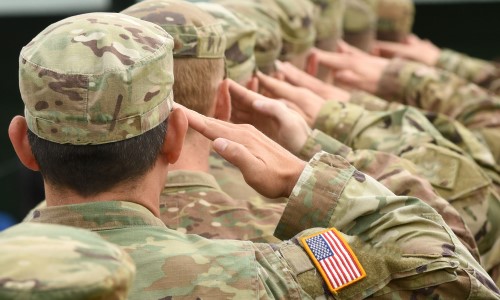
11.8.19 – SSI-
Allied Universal CEO Steve Jones explains how veterans entering the workforce already have identifiable skills that can be transferred to the physical security world.
As CEO of Allied Universal, I believe that veterans, service members and reservists are unsung heroes who serve, secure and care for the people and communities in every corner of our world.
I’m proud to say that Allied Universal has hired more than 33,000 veterans over the last five years. We appreciate all military personnel and veterans that serve our country and all of our 215,000 employees that protect our communities every day.
We firmly believe that veterans make ideal employees, especially within the physical security sector. Here are five reasons why:
1. Advance Through the Ranks
With “private security service revenues forecast to rise 3.2% annually to $70 billion annually in 2021,” (source) the physical security sector offers vast opportunities for advancement. Advancing in the physical security sector demands many of the same qualities military veterans are known for including battle-tested real-world experience, trainability, adaptability, dependability and ability to deliver quality work in pressure cooker situations. Physical security companies recognize and applaud employees who seek to continually improve their skill set.
2. Talent for Technology
Look at the physical security world today and you’ll see security personnel experienced with robotics, video analytics, access control and biometric technologies. Military personnel who are transitioning to civilian jobs offer high-tech skills with sophisticated systems and software.
Military veterans, who train and learn to survive the rigors of war, understand better than anyone that continual training is part and parcel of a successful mission whether it is in Afghanistan or working for a Fortune 500 company.
3. Clear to Report
Military background checks are rigorous as many military positions involve classified information pertinent to national security. Even if the military job is entry-level and has no security clearance, the military will conduct a background check to ensure a candidate is “reliable, trustworthy, of good conduct and character, and of complete and unswerving loyalty to the United States.”
4. Team Players
Teamwork is a vital lesson all military veterans learn. In the military, you live and work together, and are taught to support your team members and efficiently collaborate with the people around you. This is an invaluable skill in the security sector whether you are seeking an entry level or management position.
5. No Military to Civilian Decoder Needed
Veterans need a ‘military to civilian decoder’ system to help explain the significance of their military skills and how they translate to the general employment landscape. The physical security sector, however, understands the language of the military and doesn’t require that military responsibilities be coded into language that non-military can understand.
Veterans generally enter the workforce with identifiable skills that can be transferred to the physical security world and are often skilled in technical trends pertinent to business and industry. And what they don’t know, they are eager to learn — making them receptive and ready hires in physical security environments that value ongoing learning and training.
While some businesses talk the talk about why military veterans are important hires, the physical security sector actually walks the walk. We honor and appreciate the sacrifices made by our nations’ military and seek out ways to show our appreciation each and every day.
 Steve Jones is CEO of Allied Universal, a leading security and facility company in North America that provides security services and technology solutions.
Steve Jones is CEO of Allied Universal, a leading security and facility company in North America that provides security services and technology solutions.
